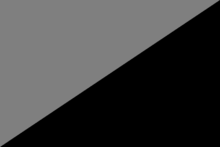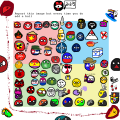Agorism shortened to A3 (Anarchy, Agora, Action) is an Anarchist and economically right-wing ideology, usually slightly progressive.
Agorism as a political ideology believes that the best way to achieve Anarchism is through the black and grey markets. Creating a society in which all voluntary exchanges are done through said markets by means of counter-economics engaging in peaceful revolution. It was first proposed by Samuel Edward Konkin III at the conferences CounterCon I in October 1974 and in CounterCon II in May 1975.
For Agorism it is important to distinguish between Grey and Black markets and a "Red Market", Agorism generally only supports behavior that is either Legal but outside the framework of the state system (Grey market) or that which is Illegal but not inherently violent (Black market), but it does not support trade relating to things that violate the Non-Aggression Principle (The Red Market). He supports all usage of Counter-economics defined as the sum of all non-aggressive Human Action which is forbidden by the State[1].
Some people tend to say Agorism is a Left-Libertarian ideology[2][3] or that it is a ![]() Left Market Anarchist ideology and and that it is not related to right-wing market anarchism in any way, this, although true in part because of Konkin referring to Agorism as so, it's false due to he not using the term with the standard definition referring to Libertarian Socialism, he used it as defined by Roderick T. Long as a reintegration of libertarianism with concerns that are traditionally thought of as being concerns of the left. That includes concerns for worker empowerment, worry about plutocracy, concerns about feminism and various kinds of social equality[4].
Left Market Anarchist ideology and and that it is not related to right-wing market anarchism in any way, this, although true in part because of Konkin referring to Agorism as so, it's false due to he not using the term with the standard definition referring to Libertarian Socialism, he used it as defined by Roderick T. Long as a reintegration of libertarianism with concerns that are traditionally thought of as being concerns of the left. That includes concerns for worker empowerment, worry about plutocracy, concerns about feminism and various kinds of social equality[4].
Opinion on property
Having established that although sometimes being regarded as Left-Market Anarchists or Left Libertarians Agorists are indeed Right-wing Libertarians, but a more indepth on Agorism opinion on property and entrepreneurs, etc... is still necessary. Agorism divides owners of the means of production in three groups. Entrepreneurs, Holders of Capital and State Capitalist. Agorism's opinion on each are good, neutral and bad respectively. It believes that the first group are the strength of free markets, risk takers and producers; it believes the second group are relatively drone-like non-innovators; and believes the 3rd group is the main evil of the public real and the true and biggest beneficiaries of the government. It differentiates with Anarcho-Capitalists since they conflate the first and second group while Marxists conflate all three[5].
Furthermore on the topic of property it is also worth checking Konkin's opinion on intellectual property. Konkin abruptly opposed intellectual property rights and wrote and essay called "Copywrongs" about it[6] and regarded them as creators of monopolies and market distortion.
History
The history of the term comes from the word Agora, which comes from Ancient Greek as the word ἀγορά, referring to an open space in which a market takes place in a "polis" (πόλις) or city[7].
About the ideology itself, according to Konkin, Agorism was a concept founded on a context of political alienation as it was the 60s and 70s[8]. He credits mainly the ![]() Austrian School of economics and economists such as File:MinarchistLudvig Von Mises as main inspirations for the economic beliefs and the creation of Agorism in general.
Austrian School of economics and economists such as File:MinarchistLudvig Von Mises as main inspirations for the economic beliefs and the creation of Agorism in general.
Konkin says that during the 70s, in said context of political alienation, Libertarianism gained force and divided in two wings, ![]() Rothbardianism, who chose to create alliances with matching movements (on some instances), such as the
Rothbardianism, who chose to create alliances with matching movements (on some instances), such as the ![]() Paleoconservative movement and the
Paleoconservative movement and the ![]() New Left, to influence people into the Libertarian movement, which later resulted in blends such as the
New Left, to influence people into the Libertarian movement, which later resulted in blends such as the ![]() Paleolibertarians and the
Paleolibertarians and the ![]() Left-Rohbardians; and
Left-Rohbardians; and ![]() Robert LeFevre and his West Coast followers, who advocated for a "non-participatory form of civil disobedience".
Later, according to Konkin, this second wing lost power and faded away, and with the creation of the Libertarian Party the Libertarian discussion polarized between Partyarchism and Agorism as the proposed methods to achieve the Libertarian ideal society.
Robert LeFevre and his West Coast followers, who advocated for a "non-participatory form of civil disobedience".
Later, according to Konkin, this second wing lost power and faded away, and with the creation of the Libertarian Party the Libertarian discussion polarized between Partyarchism and Agorism as the proposed methods to achieve the Libertarian ideal society.
Opposition towards Democracy
Agorism has the core belief that the best possible way to achieve a Free society (A stateless society based around voluntary association and free markets) is through peaceful revolution through counter economics, as already defined, the enhancement of any non-violent act prohibited by the government, black markets, drugs, or any kind of disobedience. This would, through profitable civil disobedience[9], eventually lead to "starving the state", tranfferring its current duties towards decentralized instituons provided by the market. In his words: "Rather than slowly amass votes until some critical mass would allow state retreat (if the new statists did not change sides to protect their new vested interests), one could commit civil disobedience profitably, dodging taxes and regulations, having lower costs and (potentially) greater efficiency than one's statist competitors – if any."
Opposition to political parties
Consequently, because of opposing democracy as a valid method for the achievement of a free society, he also opposes the method by which Libertarians through democracy are supposed to meet this end in this case. Agorism doesn't support any party as a mean of transition towards free market anarchism. The methods of organizations such as the US Libertarian Party aren't compatible with Agorist philosophy or praxis at all. He regards "partyarchy" saying 'Partyarchy, the anti-concept of pursuing libertarian ends through statist means'[10]
Personality and Behaviour
How to Draw

- Draw a ball,
- Fill it with grey (#808080),
- Draw a diagonal line and fill the bottom part with black (#141414),
- Draw eyes and you are done!
Relations
Friends
 Anarcho-Capitalism - I don't like how he calls himself a capitalist because of statist connotations but he's cool.
Anarcho-Capitalism - I don't like how he calls himself a capitalist because of statist connotations but he's cool. Mutualism - He doesn't like private property but he's cool otherwise.
Mutualism - He doesn't like private property but he's cool otherwise. Piratism - Also doesn't like copyright.
Piratism - Also doesn't like copyright.
Frenemies
Enemies
 Corporatocracy - black market go whoosh!
Corporatocracy - black market go whoosh! Minarchism - Damn Nozick and his Nozis...
Minarchism - Damn Nozick and his Nozis... Democracy - Voting is violence!
Democracy - Voting is violence!
Further Information
Literature
Wikipedia
Gallery
Template:Libright Template:Anarchist
- ↑ "Counter-Economics: what it is, how it works" (PDF).
- ↑ "Smashing the State for Fun and Profit Since 1969" An Interview With the Libertarian Icon Samuel Edward Konkin III (a.k.a. SEK3)".
- ↑ D'Amato, David S. (27 November 2018). "Black-Market Activism: Samuel Edward Konkin III and Agorism". Libertarianism.org. Retrieved 21 November 2019.
- ↑ Long, Roderick. T. (4 January 2008). "An Interview With Roderick Long". Liberalism in English. Retrieved 21 December 2019.
- ↑ [1]
- ↑ Konkin III, Samuel Edward. "Copywrongs"]. Archived 13 August 2006 at the Wayback Machine.
- ↑ Gordon, David (1 April 2011). "Sam Konkin and Libertarian Theory". Retrieved 21 November 2019.
- ↑ Konkin III, Samuel Edward. "Last Whole Introduction to Agorism" (PDF). Agorism.info. Retrieved 14 June 2015.
- ↑ Konkin III, Samuel Edward. "Last Whole Introduction to Agorism" (PDF). Agorism.info. Retrieved 14 June 2015.
- ↑ Konkin III, Samuel Edward (1980). "New Libertarian Manifesto" (PDF). Agorism.info. Retrieved 21 November 2019.
